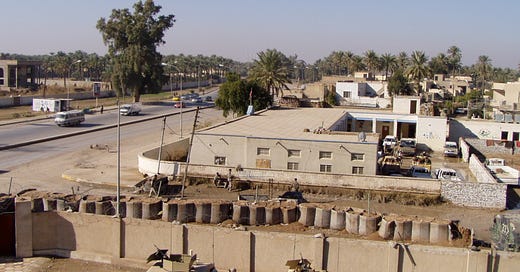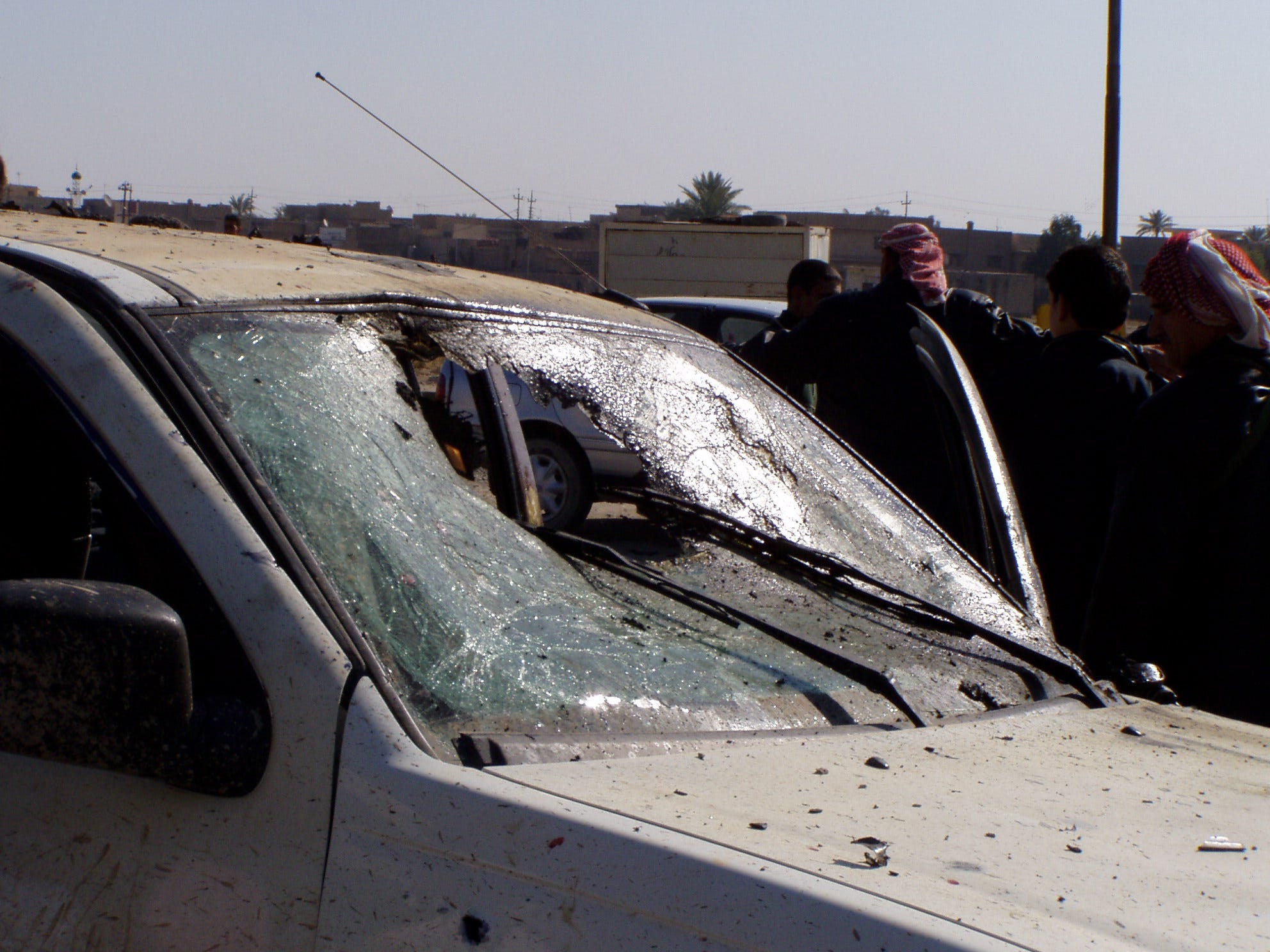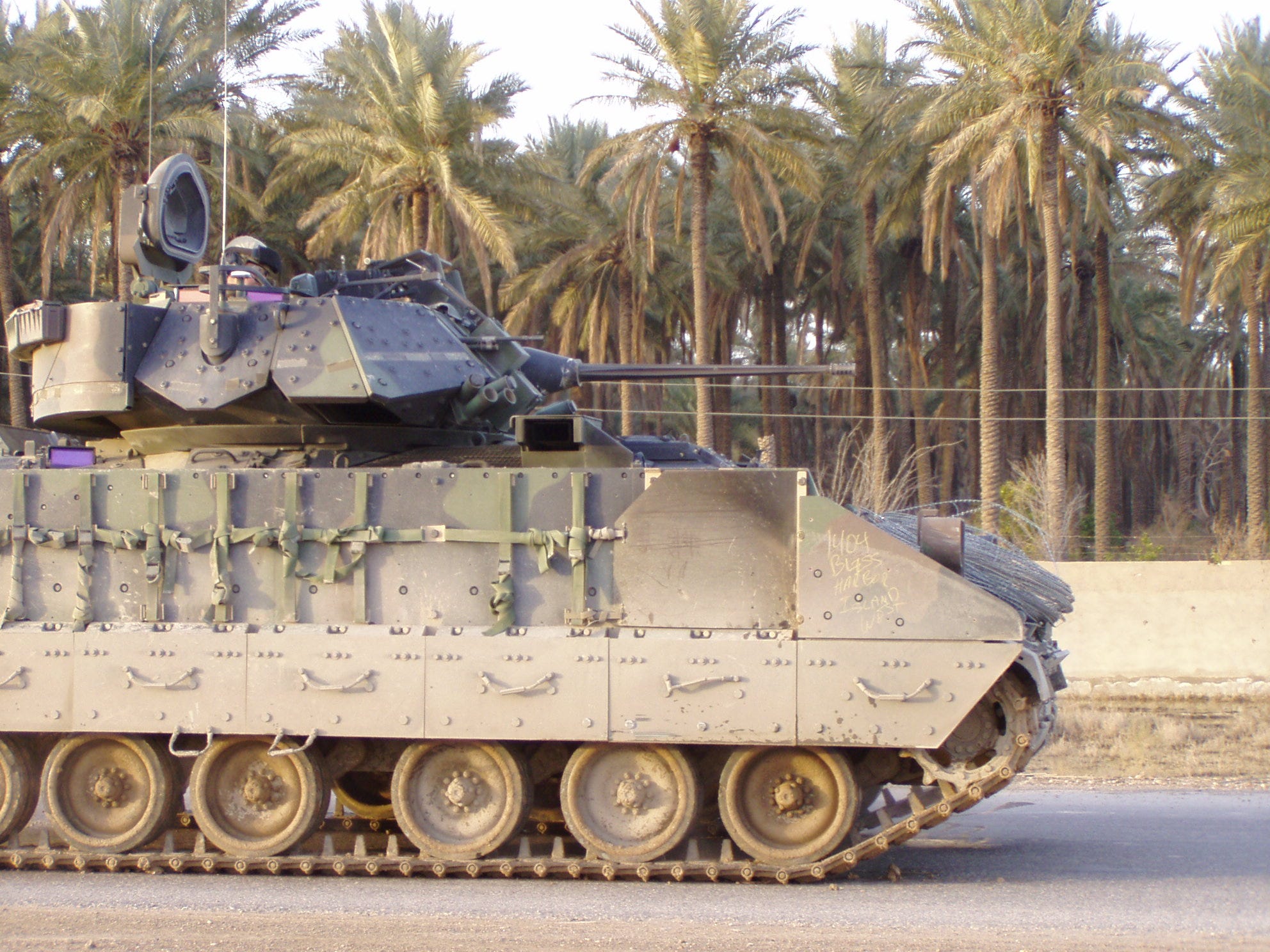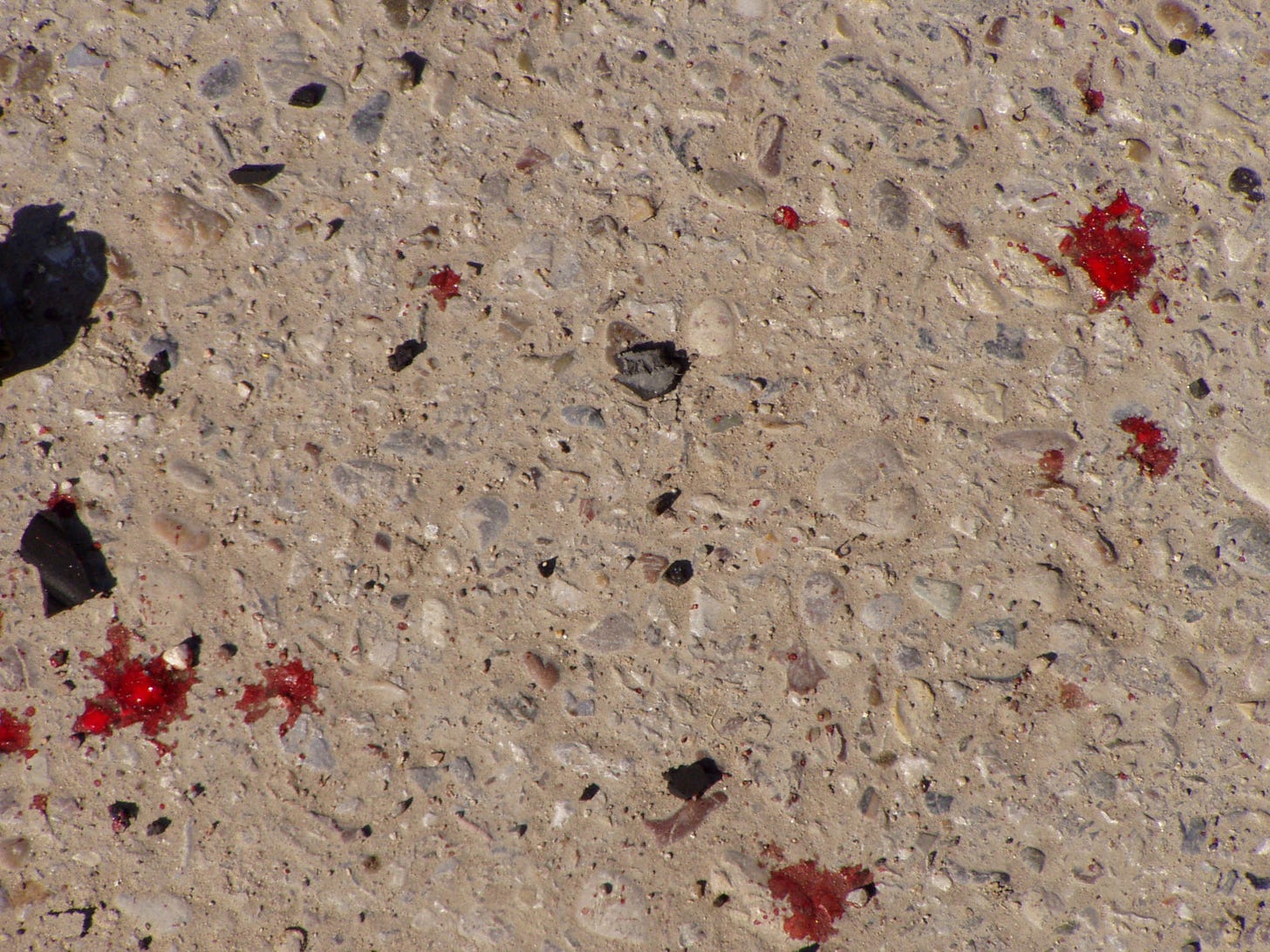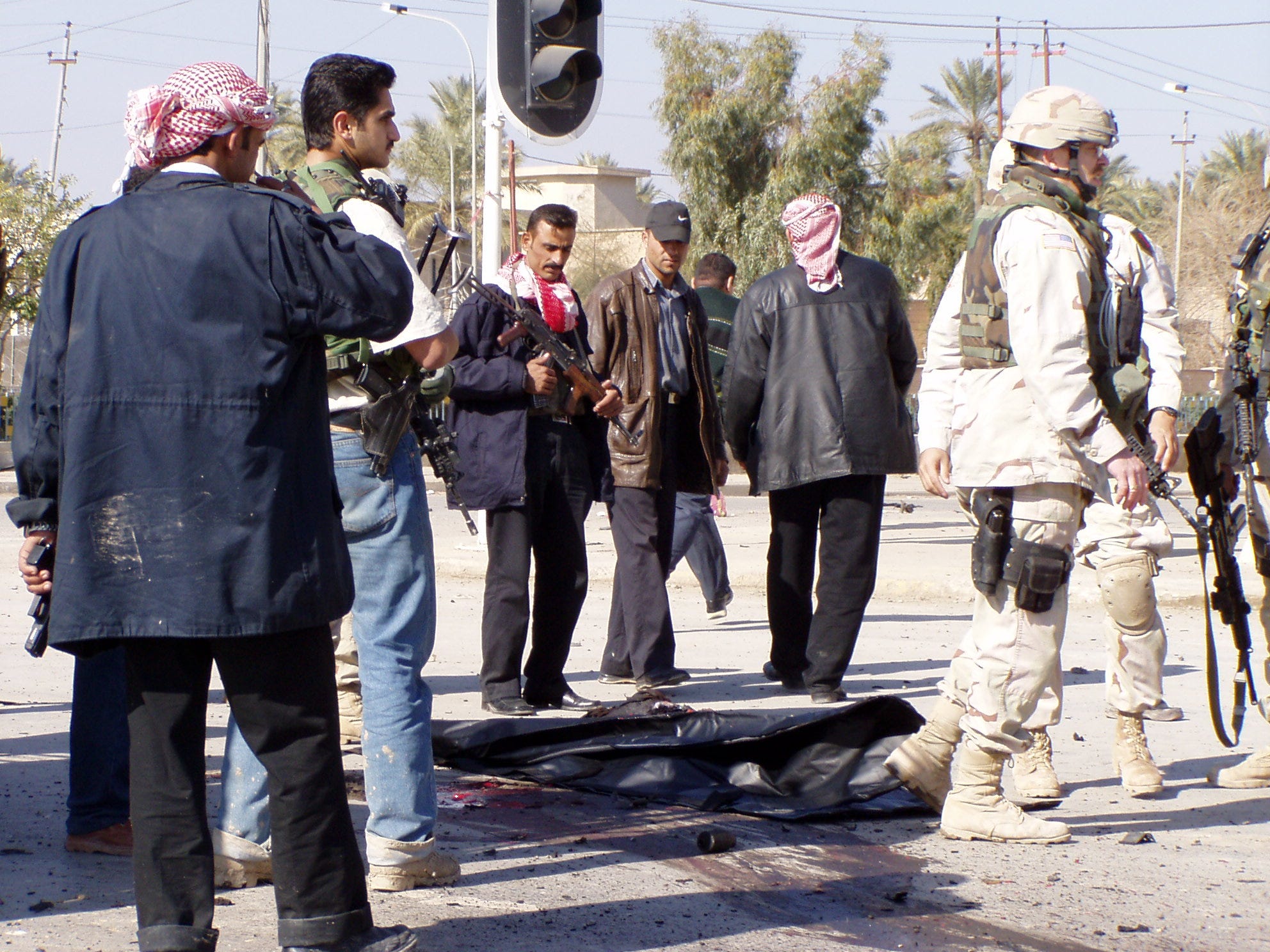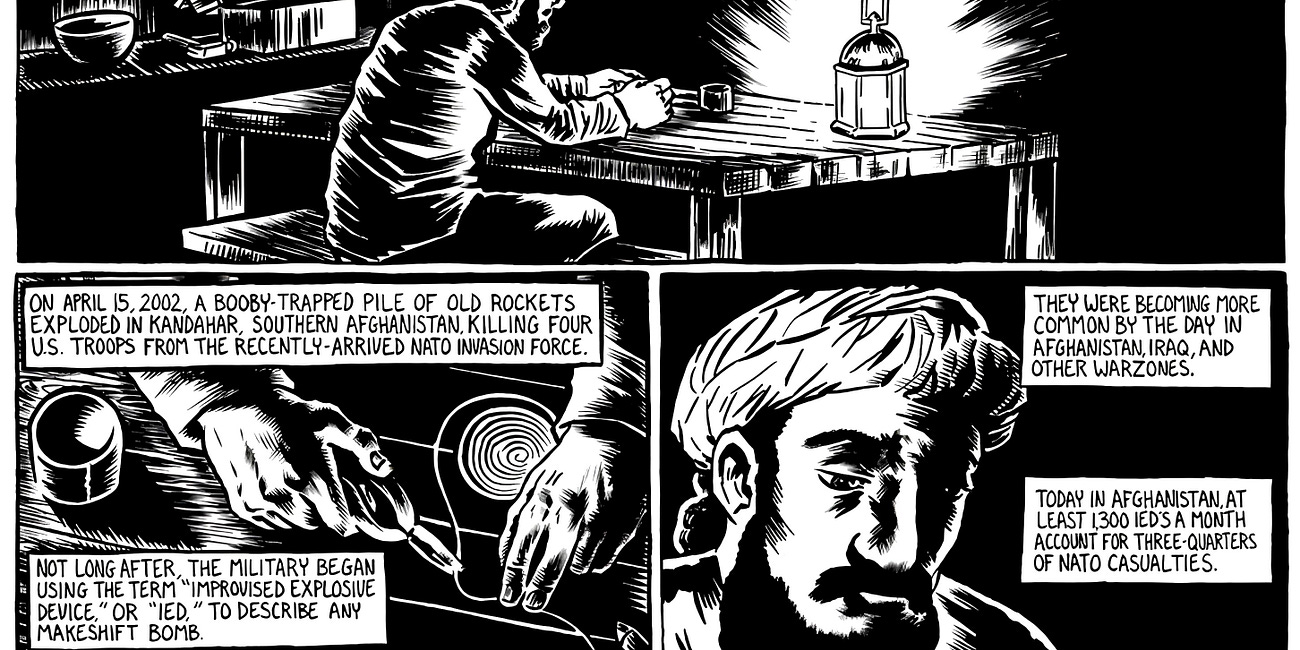There was an explosion outside and a chorus of gunfire. The windows shattered, the walls shivered and dust powdered down from the ceiling. I tasted floor and dirt and realized I was on the ground.
They’d called this U.S. Army-staged public relations event, at a Baqubah government building on Jan. 27, 2005, “Peace Day.”
That’s right, we were going to have us a Peace Day right in the middle of one of the shittiest, most violent cities in one of the shittiest, most violent countries in all the world at pretty much the zenith of its shittiness, the week preceding its first national elections in a generation.
We should’ve known it’d get blown up. Murphy’s Law demanded it. But if Peace Day was the joke and whatever was happening outside the punch line, then what was I? Jokes weren’t supposed to have casualties.
I picked myself off the ground, wiped my dusty hands on my khakis and left a scrawl of blood I wouldn't notice until much later. I looked around. In the instant before the blast, there’d been a dozen surly Iraqis in robes and headdresses slouched in folding chairs with cigarettes dangling from cracked lips, and a bunch of Army officers all standing around with their arms tightly crossed, laughing too loudly at forced clever remarks, trying hard to look like they weren’t terrified.
Now there was no one. In the wake of the blast, with the dust settled, the place was as still as—dared I say it?
Death.
What did it feel like, I wondered. I felt numb, empty, stupid—was that it? Was I dead? I did seem to be the only person in the room, all of the sudden. Maybe when you died you were frozen in the place and time of your parting while the living world moved on without you. Maybe when you died you just sort slipped out of the stream. Maybe death was boredom and I was doomed to sit here alone at Peace Day for all of eternity, an idle soul in a nowhere place far from home.
Shit, I thought, Peace Day sucks.
A hand gripped my arm and a voice said, “Here we go.”
It was my reporter buddy D.P., a portly, balding man who’d covered a dozen wars over the decades and who’d taken a liking to me because, I suspected, I reminded him of himself 25 years ago—naive and skinny.
He dragged me out of the auditorium, down a hallway and into an office where frantic soldiers in U.S. Army tan and green were picking things up, putting things down, picking them up again and looking around, desperate for someone to just tell them what to do.
Outside, there was gunfire. It was close.
Now I remembered. We'd taken off our helmets and body armor and left them here. Hell, we'd apparently reasoned, it's called Peace Day, not War Day.
D.P. was sweaty and wide-eyed in a practiced sort of way. He pressed my budget body armor into my chest, and then my Army-surplus Kevlar helmet, too. I totally put my armor on wrong—it was all crooked and uncomfortable, too tight around the ribs and one of the Velcro straps was dangling.
But I didn’t care. Scooping my helmet onto my head with one hand, fumbling for my camera with the other, I headed back the way we’d come. Behind me, D.P yelled something about being careful, as if watching my step and looking both ways was going to help when we just got blown the fuck up.
The gunfire outside was only getting louder.
Back in the auditorium, soldiers crawled out from under the furniture where they’d taken cover. Our Iraqi guests were long gone. A cameraman hefting this massive T.V. camera on his shoulder was standing there sizing up the naked frame of a blown-out window.
I could almost see the calculations in his head. He glanced at me, grinned and then took a deep breath and leaped through the window toward, for all I knew, certain death.
I was in awe and a little bit pissed. With that singular gesture, he’d raised the bar far higher than I was interested in jumping.
Damn it. Now we’re both going to die.
I edged in close and peered around the frame. Surprise: I didn’t see the cameraman’s bloody body. In fact, I didn’t see anything but dirt and smoke and brick walls. That’s when it occurred to me that I didn’t have any idea where I was.
Sure, I knew the country, Iraq, and the city, Baqubah. But I didn’t know where in the city I was, how big a place Baqubah was, how the locals really felt about Americans or how to tell a good Baqubahmanian or Baqubahnder or whatever from a bad one.
I didn’t speak a single word of Arabic; I didn’t even know how to say any of the three phrases every American Iraq correspondent should learn: “I’m a reporter.” “I’m from Canada.” “Fuck George W. Bush.” And if I followed that cameraman outside, I might find that the world was a lot less forgiving of my inadequacies than I had always assumed.
Fucking Hell. Am I ready to die for this?
A machine gun answered in its drumbeat language, budda budda budda. That was no help at all, so I made eye contact with a shell-shocked soldier still picking himself off the floor. But the guy just grimaced in a way that said, Whatever, dude.
So I let my camera lead me. Staring at the glowing display, seeing the world only by proxy, I threw one leg over the frame, briefly straddling it before stepping entirely into the open air of a naked courtyard hemmed by the frightening chatter of guns. Now the smoke and brick walls were only images on a two-by-three-inch screen.
Nothing was real. There were only representations. And representations never hurt anybody.
I was a writer. Writers can’t die.
I began to run towards the source of the smoke. Beyond the brick walls were more walls—and a line of idle U.S. Army Humvees. Two soldiers were sprinting to the trucks, their helmets bouncing on their heads, their gear rattling against their armor vests, their boots scrape-scraping on the gravel. One had a digital video camera under his arm; the other, a woman, I recognized.
It was Sgt. K.S., an Army journalist.
Christ. Is everyone in this war a reporter?
A million years and one bombing ago, I’d read one of K.S.’s dispatches from Fallujah in an Army magazine. It was this gritty blow-by-blow about a bunch of grunts pinned down by snipers for hours—something like this:
GRUNT ONE: I’m stuck behind this truck and I can’t move. What can you see?
GRUNT TWO: Um, nothing. I’m stuck behind this wall. Crap! Was that a gunshot? God, I’m hungry.
GRUNT ONE: I think I’m going to die. Yeah, I’m hungry too. And I’ve got to pee. This is stupid.
GRUNT TWO: Tell me about it.
It was the kind of experience that changed the lives of the grunts—and the kind of story you could never sell to a civilian editor because, frankly, who cares about anything so dull?
I caught up to K.S. as she was tugging at a Humvee’s thick armored door. “Mind if I join you?” I said, but I didn’t wait for a response. I was already climbing into the back seat.
“Not at all,” K.S. said. I wasn’t even sure she knew who I was—or cared.
The shooting had died down and the smoke was clearing, but now there were vehicles roaring and people shouting. None of us had any idea what was going on—or even where—and finding out, and seeing it for ourselves, had, in five minutes’ time, become our lives’ purposes.
And as the Humvee’s engine turned and we sped through a gate onto an adjacent side street, I had just enough time to wonder what the Hell was wrong with us. Then we turned to face a nearby intersection of this and another major road.
Things were happening.
Having driven only a few yards, K.S. hit the brakes, threw the Humvee into park and out we spilled.
There were American soldiers everywhere, some crouched and aiming rifles at nothing, others just standing around looking bored. Others screamed at each other, at the civilians milling around or at slouching Iraqi cops toting AK-47s.
Iraqi soldiers in tricked-out white and red Nissan pickups weighed down with massive machine guns leaned around turns at unsafe speeds and fired their weapons in the air for no good reason, ratatatatat, while Bradley armored vehicles muscled onto side streets, blocking traffic with their bulk, their bug-eyed turrets sweeping mutely side to side.
Everywhere there was smoldering metal wreckage. On the asphalt before me, I saw the starburst black streaks that betrayed the site of an explosion. But at their center there was nothing, no crater, not even a single charred nut, bolt or fastener.
All around the starburst were smashed cars with bloody windshields. And on the ground were slimy red smears from where dying people had dragged themselves to nearby shops. It was a car-bombing, a massive one—one big enough to all but obliterate the bomber’s car.
I moved through the debris with my finger on my camera’s exposure button, click click click. K.S.’s videographer was at my elbow with his tape rolling, apparently shooting that heroic cameraman who was, himself, panning across the carnage.
At my other elbow, plainclothes Iraqi cops kicked open the trunks of damaged cars, looking for God-knows-what. I doubted even they knew. Behind me, I heard a soldier recite a line he’d obviously been saving for the press for a moment just like this:
“Welcome to Baqubah.”
A gaggle of grumbling soldiers wearing purple latex gloves bustled past, one of them hauling a clear plastic bag full of what looked like chicken nuggets. Human flesh, I realized as one stooped to pluck a glob of charred fat off the ground and toss it into the bag.
Grinning Iraqi cops trotted ahead of the scavengers, dancing over chunks of blackened meat, pointing with their AK-47s, babbling in Arabic. A cop waved to get my attention. “Mister! Mister!” With one hand he pantomimed shooting pictures. He smiled, showing wide yellow teeth, and gestured at his feet with his eyes and his rifle.
He was standing over a torso.
I faltered. I found my footing. I kept walking. I brushed the cop aside and focused my camera on the remains.
Click. Click.
It had no arm or legs … no head. It was naked and hairless and, in places, skinless. It oozed blood and something else, something yellow that swirled in the blood like mixed paint.
Click.
It was the bomber. It had to be.
Behind me I heard cursing. The scavengers pried their way through a gathering crowd of cops, crouched to unroll a black body bag then, grabbing the torso at both ends, one two three!, heaved it onto the bag. Goo dripped and splattered on my boot.
I backed off, moving away from the body and the growing crowd, listening for my heart to start beating again. A thin wisp of smoke curled around my nose. Looking down, I saw what appeared to be a cube of smoldering foam but was, I somehow knew, the bomber’s foot.
I kneeled. I took pictures. I noted the delicate spots of blood dotting the asphalt. Stroking the ground with my fingertips while my eyes were locked on my camera, I felt hot metal and let my fingers close around it.
I endured the pain, raised my hand to my face and opened it. There was a twisted shrapnel sculpture burning on my palm. I pocketed it. There was blood, too—fresh wet crimson blood, running from a gash in my hand. I wondered where the wound had come from and decided that I’d been hit by flying glass when the window shattered.
Now I saw blood everywhere: on my clothes, on my camera, smeared on exposed skin where I’d touched myself. I thought about liquids under pressure, tubes, threads and meat—and I felt woozy and fragile.
I stowed my camera, turned around and marched straight for K.S.’s Humvee. Passing giddy soldiers in chatty huddles, I heard things like “suicide bomber” and “election week” and “Iraqi cops got hurt” and “what an asshole.” I was startled to hear the epithet until I realized they weren’t talking about me.
That’s when I smelled it, when the stink of burned rubber and flesh, spilled blood and gunpowder jammed its ugly finger up my nose and twisted hard. I said something stupid and light-hearted like, “Dang! That stinks!” while shaking my head. I was a dog trying to shoo a fly.
I’d read enough novels and seen enough movies to know how I was supposed to feel right now. Relieved at having survived. Ecstatic, even, with a new appreciation for life. Sad for those who’d died and a little guilty that I hadn’t shared their fate.
But all I felt was sick to my stomach from the stink and satisfied that, having invested all this money and come all this way, from South Carolina of all places, and having endured nearly two weeks of dangerous tedium with a bunch of National Guard truckers before coming to Baqubah, I finally had what I’d been looking for: a decent story.
And I was amused—amused that some extremist asshole had invested his entire existence in striking a blow against the foreign infidels but had succeeded only in justifying this circus.
D.P. stood beside K.S. at the Humvee’s bumper. They were talking about this Czech reporter who’d gotten so spooked by the bombing that he’d just started running in the opposite direction.
“What a pussy,” I said, plugging neatly into the gossip. At a pause in the conversation, like it was some kind of fucking punch line to a joke that begins, so one day an aspiring writer and a suicide bomber walked into a bar in occupied Iraq, I raised my bloody hand, grinned and said, “Do I get a medal for this?”
Read more:


